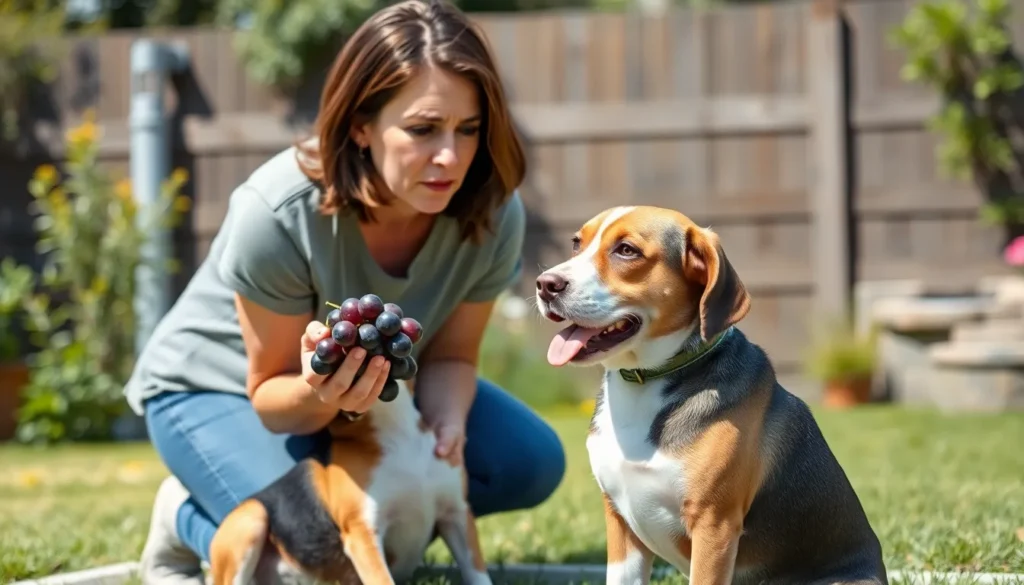Dogs are often considered part of the family, and pet owners want to keep their furry friends safe and healthy. However, many might not realize that some common foods can be harmful to dogs. Grapes, for example, pose a serious risk, yet they often find their way into households where dogs roam freely.
Understanding why grapes are toxic to dogs is crucial for any pet owner. Even a small amount can lead to severe health issues, including kidney failure. This article delves into the reasons behind this dangerous fruit and offers insights on how to keep dogs safe from potentially harmful foods.
Table of Contents
ToggleUnderstanding the Toxicity of Grapes
Grapes pose significant health risks to dogs, leading to serious conditions such as kidney failure. Recognizing these dangers is essential for pet owners.
What Makes Grapes Harmful to Dogs
Grapes contain unknown toxins that can adversely affect dogs. Even a small quantity may lead to poisoning. Research indicates that the toxic dose varies by individual dog. Dogs may not exhibit any initial symptoms, which can delay diagnosis and treatment. Studies show that specific breeds might be more susceptible than others, yet all dogs are at risk.
Symptoms of Grape Toxicity in Dogs
Signs of grape toxicity can manifest within hours of ingestion. Common symptoms include:
- Vomiting
- Diarrhea
- Lethargy
- Loss of appetite
- Abdominal pain
- Increased thirst
- Decreased urine output
Immediate veterinary attention is critical if any symptoms appear after grape ingestion. Prompt treatment can be crucial in preventing severe health outcomes.
Mechanism of Grape Toxicity

Grapes contain unknown toxins that can significantly affect a dog’s health. The specific compounds responsible for toxicity remain unidentified, making it crucial for dog owners to avoid offering grapes to their pets.
How Grapes Affect a Dog’s Body
Grapes can lead to acute kidney failure in dogs following ingestion. Ingestion of even a small amount can disrupt normal kidney function, leading to a series of physiological reactions. Toxic compounds may cause oxidative stress, damaging kidney cells and impairing their ability to filter waste effectively. Affected dogs might experience symptoms such as vomiting, diarrhea, and abdominal pain within hours of consumption. Blood tests can reveal elevated levels of blood urea nitrogen (BUN) and creatinine, indicators of kidney damage.
Common Misconceptions About Grapes and Dogs
Many pet owners mistakenly believe only large quantities of grapes are harmful. However, toxicity can occur in dogs that consume a single grape or even a few raisins. Some individuals assume that certain dog breeds are immune to grape toxicity, but no breed is exempt. Additionally, some owners may not recognize that grape juice or wine can pose similar risks and should also be avoided. Awareness of these misconceptions is essential for ensuring a dog’s safety.
Safe Alternatives to Grapes
Understanding safe alternatives for dogs ensures they receive healthy snacks without the risks associated with harmful foods like grapes.
Fruits That Are Safe for Dogs
Several fruits provide health benefits for dogs while being safe options. Include the following:
- Apples: Remove seeds and core; they offer vitamins A and C.
- Blueberries: High in antioxidants; great for a low-calorie treat.
- Bananas: In moderation, they provide potassium and fiber.
- Watermelon: Ensure seeds and rind are removed; it’s hydrating and low in calories.
- Strawberries: Rich in fiber and vitamin C; they support a healthy immune system.
Healthy Treats for Your Dog
Finding healthy treats is essential in maintaining a balanced diet for dogs. Consider these options:
- Carrots: Crunchy and low in calories; they promote dental health.
- Peanut Butter (unsweetened): A favorite for many dogs; choose brands low in sugar and salt.
- Pumpkin: Provides fiber and supports digestive health; use plain canned pumpkin without additives.
- Sweet Potatoes: Cooked and mashed, they offer vitamins and are tasty for dogs.
- Chicken or Turkey: Cooked, boneless, and skinless, lean meats provide protein without excess fats.
Incorporating these fruits and treats into a dog’s diet supports their health while avoiding any risks associated with grapes and similar harmful foods.
Importance of Veterinary Guidance
Veterinary guidance is essential for ensuring the health and safety of dogs, especially concerning toxic foods like grapes. Pet owners must recognize when professional advice is necessary and what steps to take in emergencies.
When to Consult a Veterinarian
Consult a veterinarian if a dog ingests grapes or shows symptoms of toxicity, including vomiting, diarrhea, or lethargy. Seek immediate assistance if the dog exhibits decreased urine output or increased thirst. Veterinary professionals can evaluate the situation and recommend appropriate actions based on the individual dog’s health and the amount ingested.
Emergency Measures for Grape Ingestion
Emergency measures include contacting a veterinarian immediately upon suspecting grape ingestion. Providing information about the quantity and time of ingestion helps veterinarians assess the risk. Inducing vomiting, under veterinary guidance, can prevent further absorption of toxins. Blood tests reveal kidney function levels, ensuring prompt detection of any damage. Timely intervention significantly increases the chances of recovery and minimizes long-term health issues.
Understanding the dangers of grapes is essential for every dog owner. The potential for kidney failure and other severe health issues makes it crucial to keep grapes and related products out of reach. Even a small amount can have devastating effects, so vigilance is key.
Choosing safe snack alternatives not only protects dogs but also promotes their overall well-being. Regular veterinary consultations can provide further guidance on maintaining a healthy diet for pets. By prioritizing safety and nutrition, pet owners can ensure their furry companions lead happy and healthy lives.





